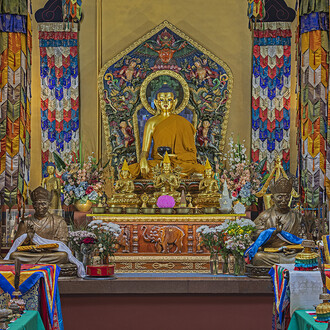The exhibition spans two distinct stages of Maksat Shagyrbay’s professional career. Over a number of years, he had been capturing the picturesque vistas of his homeland for National Geographic magazine, becoming, in a sense, an ambassador of Kazakhstan. Spread before us is an endless and timeless space that betrays human presence only via rock paintings and mysterious stone colossi whose origin can spark a heated debate between an archaeologist and an anthropologist. Adding a metaphysical dimension to these works is their contrast with the reportorial shoots of traditional equestrian games, wherein the silent expanses are flooded with sounds of neighing and hoofbeats.
The formation of the Kazakh ethnic group is just as complex as the extremely intricate history of the Great Steppe and the region’s culture. Shedding some light on it, apart from folk tales and akyn poetry, is the legacy of warrior and hunter games offering us a glimpse of what it was like to live in the times of ancient nomads. The traditional kokpar competitions, sometimes drawing several thousand participants, momentarily stir the genetic memory of the steppe which normally remains silent about the epic battles of thousands that continued here for centuries. Nowadays, the local variation of horseball might be played with a dummy instead of a real goat carcass, the riders might sport striped tracksuits and baseball caps instead of felt helmets, ambulance vehicles are on duty at the site, and a valuable prize goes to the winner – just like in high-performance sports. However, on nature’s scale, the things that humans consider important could well be on par with the invisible roaming of insects in the grass.
Maksat Shagyrbay’s snapshots feature breathtaking battle scenes far more emotionally charged than any ice hockey match. According to an ancient nomads’ saying, ‘When a strong man strains, he becomes stronger. When a weak man struts, he breaks his back.’ All it takes is to feel strong and shake of the shackles of urban life – and there you are, dashing through the steppe in the company of your trusted horse, tazy sighthound, and falcon. By the way, in Turkic languages, the word kazakh denotes a free adventurer – the same etymology is behind the Russian word Cossack.
As per another nomadic saying, the steppe is the meeting point of the three infinities: that of the steppe itself, the sky, and the human soul. The infinity of the soul and the endlessness of the Universe are one and the same here. Maksat Shagyrbay had spent a long time focusing his attention on the grasses and stones only to eventually turn to the human beings and make a self-discovery by discovering the human soul. Back in the Neolithic age, the steppe provided the setting for the special union of men and animals. The photographer enthuses about dynasties of eagle hunters, expert archers, and batyr strongmen, admiring not so much their athletic feats as their being in sync with the world around them. This is exactly what Maksat seeks to share with the viewers.
Since childhood years, Maksat Shagyrbay has been passionate about music, photography, and videography. Having learned dombra playing at a music school in his hometown of Shymkent, he went on to complete a cinematography study course in Moscow. A college graduate in accounting, Maksat has never worked in this line, but made forays into television, cinema, and mass media. His collaboration with National Geographic brought him renown in Kazakhstan for celebrating his country’s natural beauty, idyllic steppe dawns, and rural landscapes. Having secured thousands of followers on social media, he made a dramatic shift on his creative journey and started documenting the passion-driven domain of traditional nomad games.
















